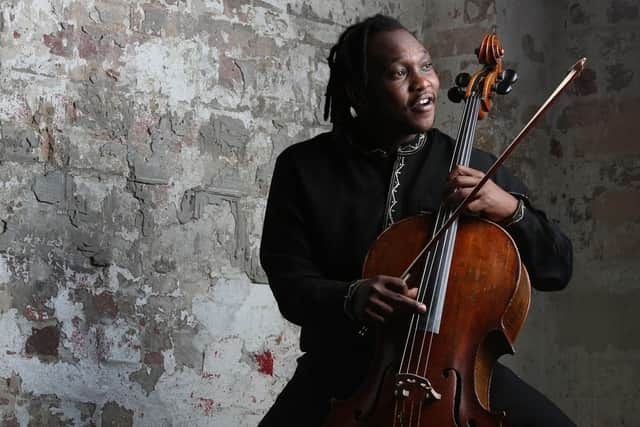Edinburgh International Festival interview: rock star cellist Abel Selaocoe
The title of Abel Selaocoe’s debut album asks a direct question: Where is Home? The obvious answer is South Africa, but after a lengthy conversation with this startlingly unorthodox cellist, composer and ethnic singer, it’s clear that identifying home is a deeper quest than mere geography.
So yes, literally for Selaocoe home is a township near Johannesburg; or to be precise, Zone 7 – Skelemeng. Despite material hardships, he has fond memories of a close family home and supportive network of uncles, aunties, brothers and cousins, “all excellent singers just expressing themselves”.
Advertisement
Hide AdAdvertisement
Hide AdImmediately you begin to sense where his extraordinary performance style comes from. His music is rooted in what he calls “ancestral memory”. He composes and improvises as intuitively as he plays Bach. The essence of his art is a penetrating fusion of ecstatic singing mined from ancient South African traditions, and his acquired passion for Classical music. Home, in other words, is a shifting concept, its meaning evolving as Selaocoe lives his own exciting adventure.
While at primary school something wonderful happened that opened his eyes to a musical world way beyond Skelemeng. “My big brother Sammy did something completely unusual for township people, he played the bassoon,” he recalls. “He was inspired by mechanisms and how things work, and liked to share that passion.
“He would gather everybody from different churches, get them on different instruments, and teach them all to read music. He got hold of a cello, and said to me, if you want to have the most expressive voice, play the cello. On Saturdays he took me to this school we call ACOSA, a cultural outreach programme in Soweto, and that’s when everything began.”
Next came a music scholarship to attend St John’s College, described as Johannesburg’s Eton, an initially daunting prospect for the adolescent Selaocoe. “Here I was, catapulted into a world of true privilege, and I didn’t even speak English,” he says. “Yet it was such an inspiring time, learning the classical repertoire and playing for the first time with orchestras, often as soloist.
The question then was, where next? “Imagine my family’s shock when the head of music said he wanted to send me to the UK for auditions at all the music colleges,” he says. Selaocoe opted for Manchester’s Royal Northern College of Music. “I was far more attracted to that than to a dazzling place like London. As soon as I walked into the place somebody said hello and I thought: this is where I’m coming.”


What he didn’t leave behind was his South African heritage. “My dream was to be this classical cellist, playing concertos. But I missed home so much I started writing my own music, inspired by early memories of home and based very much on instinctive improvisation. I’d be playing a Brahms sonata or a study, then something in it would stop me and, like a broken record, turn into an improvisation. I saw so much freedom in not reading the music; my brain just followed these beautiful patterns. The question then was how to integrate this basic urge, this music from home, into performance.”
A few months ago, a Glasgow City Halls audience – where Selaocoe performed his quasi-autobiographical work Four Spirits with the BBC SSO – discovered the answer. It was pure performance art, uniquely spontaneous, Selaocoe’s visceral and highly physical combination of cello and vocals running on rock star adrenaline. Next week’s Edinburgh Hub audience has been promised “Bach Cello Suites alongside traditional music from his homeland” but Selaocoe warns he won’t decide on the full details until moments before. “It depends on how I feel at the time,” he reveals.
Advertisement
Hide AdAdvertisement
Hide Ad“Before most concerts I write on a piece of paper what’s important for me at that moment. The answer changes all the time. I played the Hydro in Glasgow two weeks ago and the answer then was to be ‘curious’. But it’s not all about me. Music is also like prescribing things to the audience; you sit down and feel where they’re at in terms of mood. Sometimes you respond to their liveliness; sometimes you can make them super-pensive. That’s like a thing you give them, like I’ll choose this piece to affect your way of thinking. It always works!”
Abel Selaocoe performs at The Hub on 22 August, 8pm.